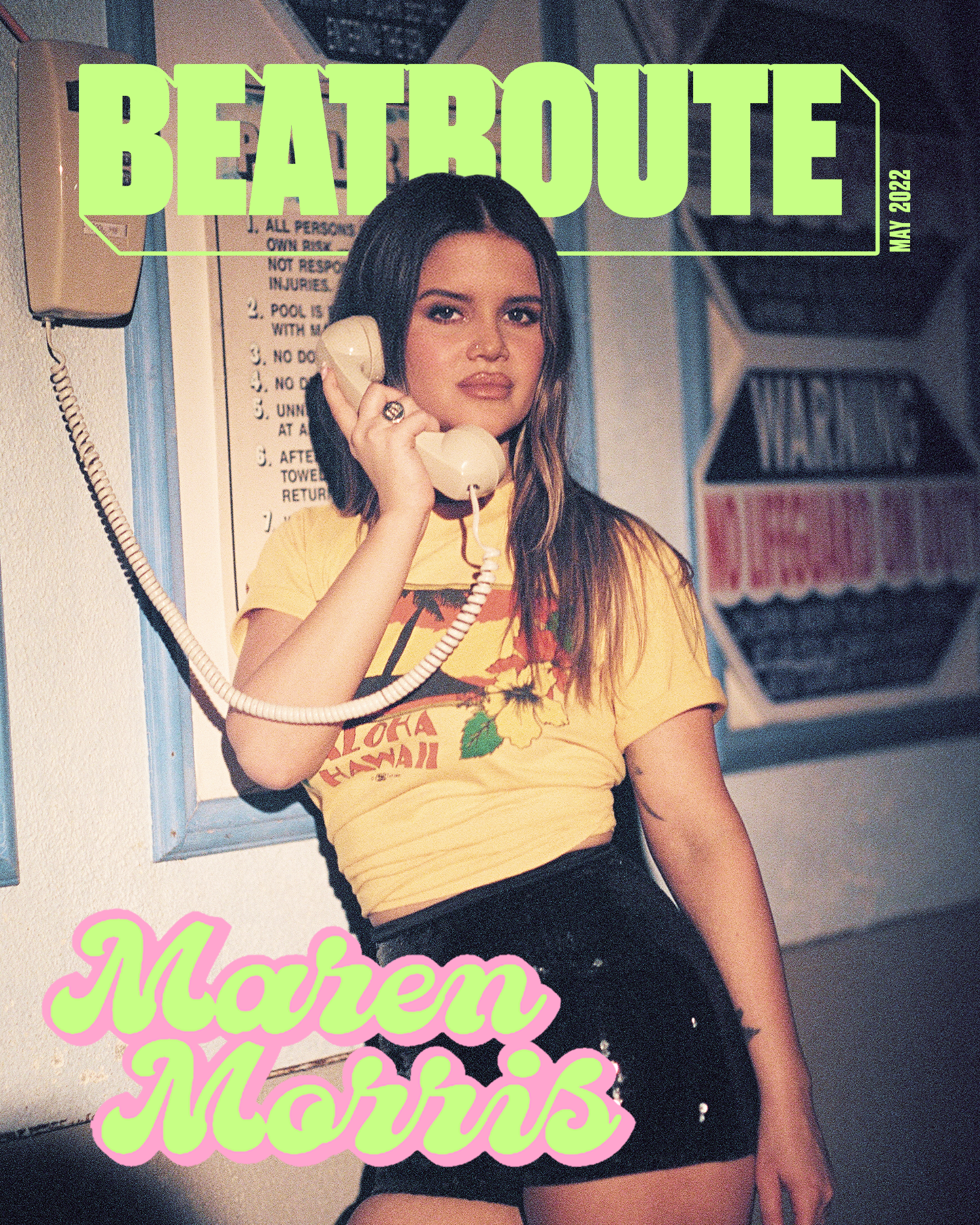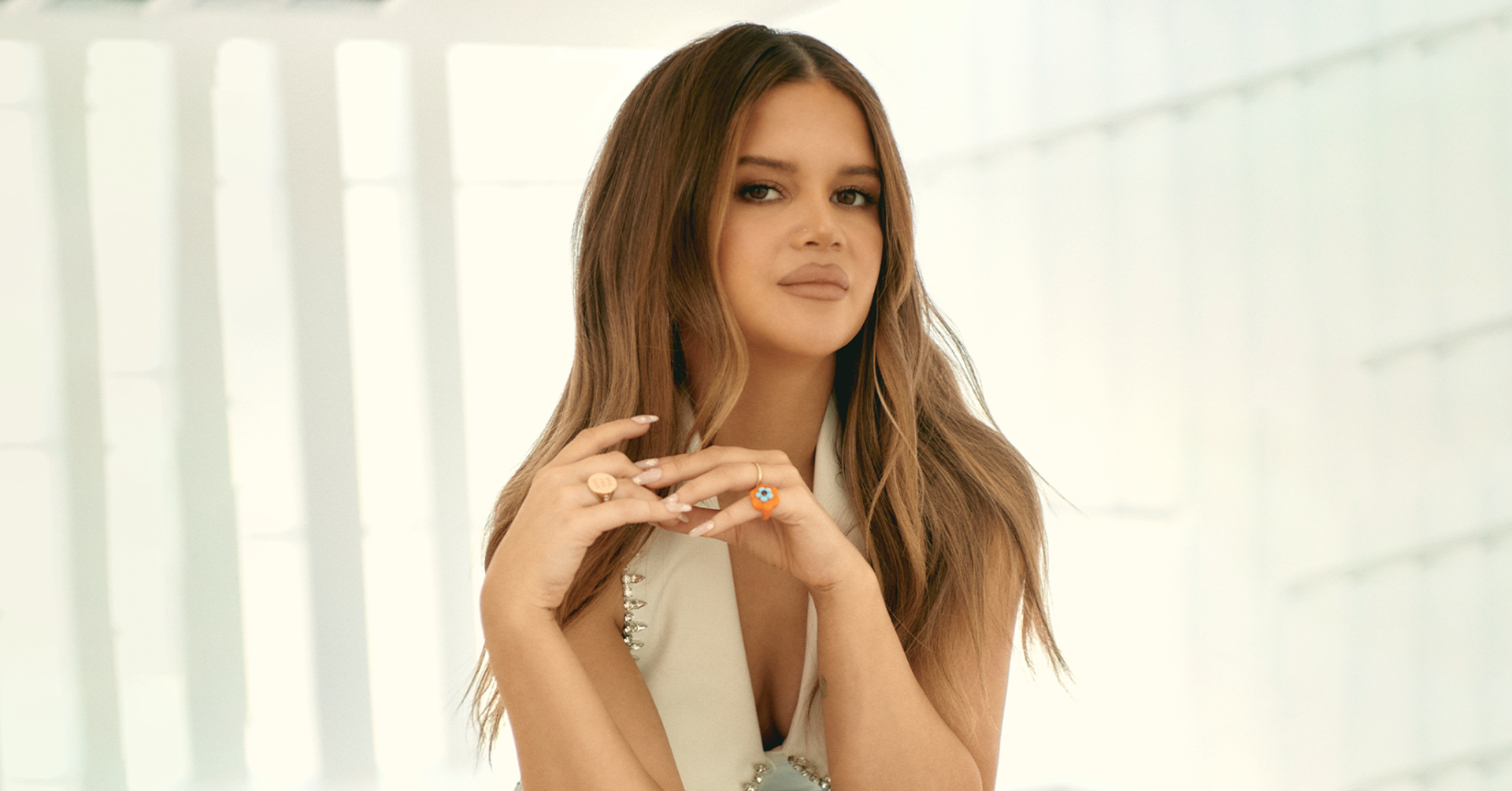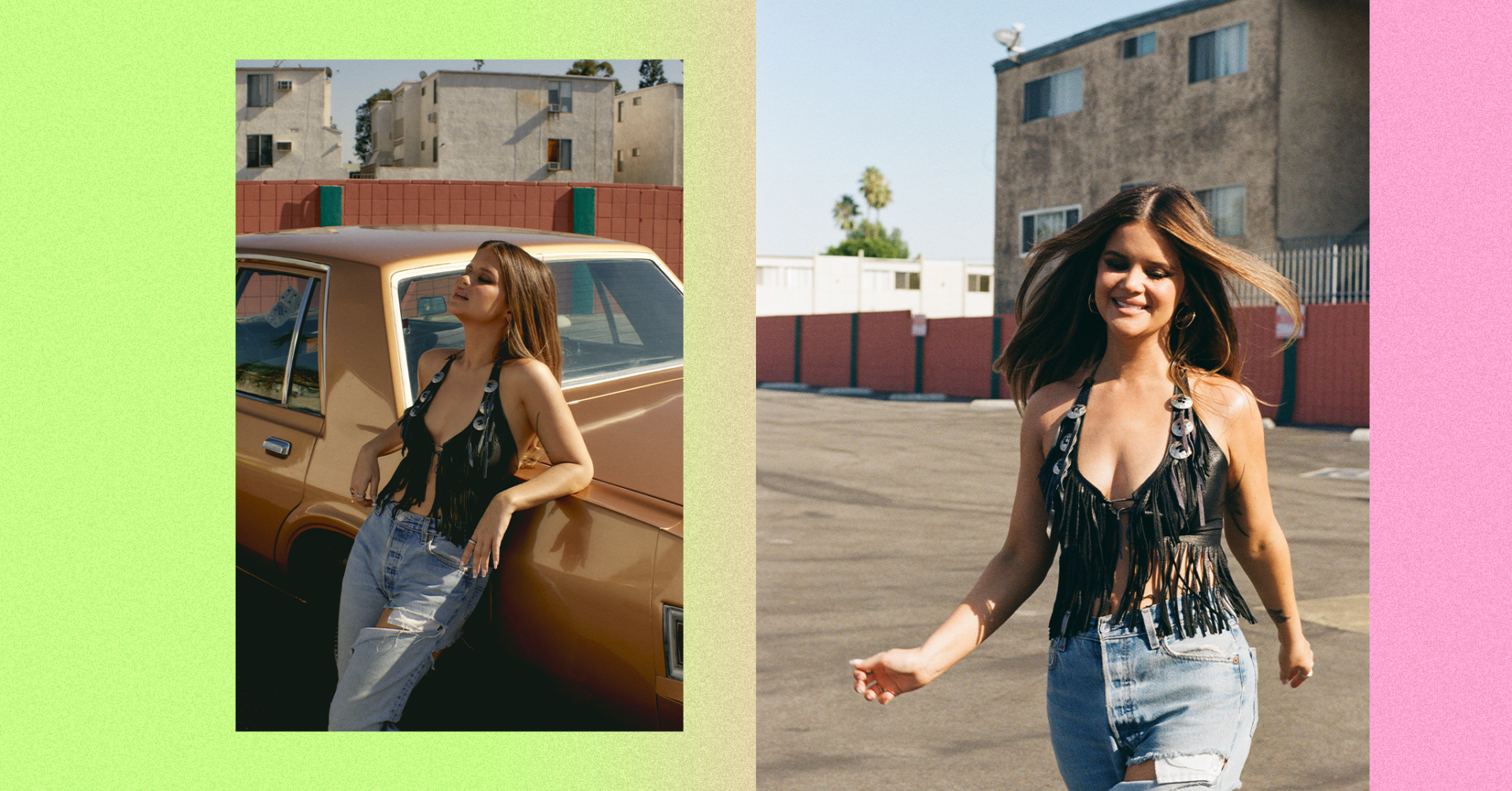COVER
Maren Morris
Knows Who She Is
By Gabby Sgherri
Publishing date: May 03, 2022
T
There are other things about me that I need to love more than just being musical,” says Maren Morris on the revelations she had during covid and the inescapable downtime it forced upon her. During that time she also gave birth to her son, Hayes, and worked on her sixth studio album, Humble Quest. Both of which were formative for her soul, “the silver lining was that it forced me to stop moving for a second and recenter [on] why I like doing this. [Even] being a mom for a few months and learning how to do that and not being artist Maren,” she divulges over Zoom from her home in Nashville. After all, artist Maren had been at the forefront since the release of her Platinum-certified debut album, HERO, in 2016 and the 2019 follow-up album, GIRL. With each album, Morris’ career has reached new heights but the moniker of “female country artist” places an invisible box with unrealistic expectations around her leading the public and media to fixate on the labels “female” and “country” more so than “artist”. As she settles into our call, I notice her son’s basketball net in the background among a sofa, a desk, and a photo wall and realize her roles as a mother and an artist can co-exist in the time and space of our conversation without one defining her entire identity.
The roles and responsibilities of an “artist” can differ depending on the person, but for Morris, it’s always included three main things: songwriting, producing, and performing. Her early years in Nashville were spent writing for other artists, giving her a formative education from the “university” of Nashville that would later serve her solo career. “What I learned moving to Nashville and being in those early writer rooms was that you have to leave all the pressure and ego at the door. Just go into the room light as a feather and dare to suck because not every song’s gonna be brilliant but it’s part of the process you have to get through the mediocre songs to get to the good stuff,” she says on her creative process. In essence it boils down to, “finding the truth in a way that hasn’t been said before and inviting an emotion to happen. You can be as clever or poetic as you want in a lyric but it has to make someone besides you feel something.” And that’s exactly what Morris did when she put pen to paper and cleared the songwriting cobwebs during covid, naming “Circles Around This Town” as the aforementioned good stuff that put gas back in her tank and dictated the sound of her new album.
There are other things about me that I need to love more than just being musical,” says Maren Morris on the revelations she had during covid and the inescapable downtime it forced upon her. During that time she also gave birth to her son, Hayes, and worked on her sixth studio album, Humble Quest. Both of which were formative for her soul, “the silver lining was that it forced me to stop moving for a second and recenter [on] why I like doing this. [Even] being a mom for a few months and learning how to do that and not being artist Maren,” she divulges over Zoom from her home in Nashville. After all, artist Maren had been at the forefront since the release of her Platinum-certified debut album, HERO, in 2016 and the 2019 follow-up album, GIRL. With each album, Morris’ career has reached new heights but the moniker of “female country artist” places an invisible box with unrealistic expectations around her leading the public and media to fixate on the labels “female” and “country” more so than “artist”. As she settles into our call, I notice her son’s basketball net in the background among a sofa, a desk, and a photo wall and realize her roles as a mother and an artist can co-exist in the time and space of our conversation without one defining her entire identity.
The roles and responsibilities of an “artist” can differ depending on the person, but for Morris, it’s always included three main things: songwriting, producing, and performing. Her early years in Nashville were spent writing for other artists, giving her a formative education from the “university” of Nashville that would later serve her solo career. “What I learned moving to Nashville and being in those early writer rooms was that you have to leave all the pressure and ego at the door. Just go into the room light as a feather and dare to suck because not every song’s gonna be brilliant but it’s part of the process you have to get through the mediocre songs to get to the good stuff,” she says on her creative process. In essence it boils down to, “finding the truth in a way that hasn’t been said before and inviting an emotion to happen. You can be as clever or poetic as you want in a lyric but it has to make someone besides you feel something.” And that’s exactly what Morris did when she put pen to paper and cleared the songwriting cobwebs during covid, naming “Circles Around This Town” as the aforementioned good stuff that put gas back in her tank and dictated the sound of her new album.

You can be as clever or poetic as you want in a lyric but it has to make someone besides you feel something.
You can be as clever or poetic as you want in a lyric but it has to make someone besides you feel something.
In “Circles Around This Town”, over a grunge-lite guitar riff, she sings “Thought when I’d hit it, it’d all look different / But I still got the pedal down,” truthfully voicing the discrepancy between the expectation and the reality of success as an artist. “My version of success has changed so many times over the years. I remember thinking oh my gosh I’m successful I got a record deal like that’s the tip of the mountain, isn’t it? and then it’s like no,” she says before laughing at her own naiveté. Her record deal was more like the tip of the iceberg as she would go on to win countless awards at the Grammys, CMAs, AMAs, and BMAs—to name a few. Her last album, GIRL, broke the record for the largest ever debut streaming week for a female country album, and her 2018 pop collaboration song with Zedd, “The Middle”, broke the record for most weeks at No. 1 on Billboard’s Hot Dance/Electronic Songs chart—making her the first country act to do so. “There were all these firsts that I was like now I’ve made it,” she openly says about her previous mindset. But the fleeting moments have led to a realization that’s reflected in Humble Quest, “I don’t know if I’m ever going to find it, I’m always going to be chasing the target and I think that’s the only way to enjoy this is if I never really feel like I’ve made it.”
The target may be constantly moving for Morris but every bullseye she’s hit has placed a bigger spotlight on her, broadening the conversation about her success as an artist to include critiques of her actions as a female. In 2019, she did a shoot with Playboy that caused an uproar among country music purists deeming it inappropriate and uncharacteristic of a role model in the genre. The photos were quite tame in comparison to the nudity typically expected from Playboy but the fixation on her identity as a “female country artist” leads the public to be ruthless when she deviates from their expectations. It’s as if she’s being held to a contract she never signed and is put on trial in the court of public opinion. But musically and personally, Morris has always marched to the beat of her own drum, creating albums that draw outside the lines of “traditional country” and encompass the many genres that inspire her. She firmly stands her ground in her values and beliefs, speaking out when necessary and refusing to conform to the terms and conditions of her genre and gender’s unspoken contract. The effective date of the latter began well before her career, “from birth women feeling like they need to make themselves smaller in a literal and figurative sense is behavior that we’re probably all unlearning,” Morris says voicing the challenges that are not a byproduct of her career but are exacerbated by her visibility as a public figure.

I think it’s badass when a woman can own her sexuality and not make any apologies for it and also not be doing it for a man’s affection.
Another challenge that lives in the Venn diagram overlap of being a female and a popular artist is unsolicited opinions on physical appearance. “When I became a mom I had an emergency C-section and the term ‘snapping back’ to my previous body was such a pressure that confounded me—why we feel as new mothers that we need to immediately erase any proof that we carried a child,” Morris confidently says echoing the sentiment she posted on her Instagram about a year after giving birth. “I’m never using that phrase again or trying to get my body back because no one took it—it’s always been mine.” In the same vein as Playboy, body shaming stems from unrealistic expectations unwillingly placed upon Morris but she eloquently pokes holes in the standards she’s held to by proving they shouldn’t exist to begin with.
On the flip side, Morris’ large audience of listeners puts pressure on her to adhere to their expectations musically too. The unforeseen blessing of taking a break from being “artist Maren” when the industry came to a grinding halt in 2020 was that it gave her enough time and space to detach from those expectations. “Covid in a weird way saved me and allowed me the time to sort out some things that I hadn’t taken a good look at because I was constantly touring and I came out on the other side a better version of myself,” Morris admits. This resulted in the intimate material on Humble Quest exploring themes of love, grief, family, and sexuality. Leaving others’ presumptions at the door and inviting solely her inner competitiveness as an artist to affect the music she created.
When the album was released in March of this year, the opinions of others inevitably entered the chat. Her single “Nervous” was deemed edgy by a country music publication due to the expression of female sexuality in the lyrics. Morris laughs when hearing the headline, then says “I didn’t consider it edgy. It’s so funny I wish there was a college course or [a] case study on female sexuality in music between country and pop.” She names songs such as “WAP” by Cardi B and “34+35” by Ariana Grande as examples of female sexuality and beauty being celebrated in pop music and juxtaposes it to country herself. “You would look at “Nervous” and be like that’s kind of prudish compared to these other two but I think it’s badass when a woman can own her sexuality and not make any apologies for it and also not be doing it for a man’s affection.” Mentioning the song “RSVP” from her previous album, “Nervous” shouldn’t come as a surprise to her listeners. “I’ve always had a song on a record that approaches [sexuality] and I wish that we were all willing to go there a bit more in this line of work because women are awesome,” she says point-blank, exiting the chat.

Morris’ comparison to pop brings up an interesting point, especially since Humble Quest is full of synth washes and drums reminiscent of other genres helmed by the production of Greg Kurstin—who’s known for his work with Adele, Foo Fighters, and Paul McCartney. “I’m so influenced by all genres [and] I think you hear those influences [on] my records. It’s country songwriting but the influences musically are all over the map,” she says, giving insight into the sonics of her album. Her music can live in the gray area between country and pop—and be praised for it—but the industry does not hold her to the same standards and expectations as female pop artists. Lyrics about female sexuality and an image showing side boob, would not have critics clutching their pearls if her identity was a female pop artist.
While Morris can void haters with the same lyrical ease that she pens her music with, there is a part of her craft that will always offer refuge from the outside world. “The time that I feel most connected to a higher power is when I’m not thinking about anything and I’m floating through my vocals.” Prefacing that she’s not a super religious person she says, “the only time I feel God is when I get to sing and there are no expectations or ego—it’s just something that I was born with. I feel the most myself when I’m finding a melody or [I’m] onstage and I don’t see anyone else I just connect with whatever is coming out of my vocal cords.” It’s a time and space that only belongs to her to celebrate her god-given talent until she floats back down and resumes the responsibilities of her many roles.
For an album so closely tied to Morris’ personal growth, it’s fitting to reframe the narrative of her as a female country artist to her as a person encompassing all the facets of her identity the same way her music does with the genres it’s influenced by. Her roles as an artist, mother, wife, songwriter, producer, and singer, purely by the nature of co-existing in her life, are not mutually exclusive. Labels don’t give an accurate representation of identity because if you peel off the sticker of “country”, “feminist” or “social justice warrior”, you’ll find all the underlapping labels that have been placed before to define someone at a previous time in their life. Morris’ has done the work to love the full spectrum of her identity, giving fans some of her best music in the process, and we should all take note.
Photographer: Harper Smith
